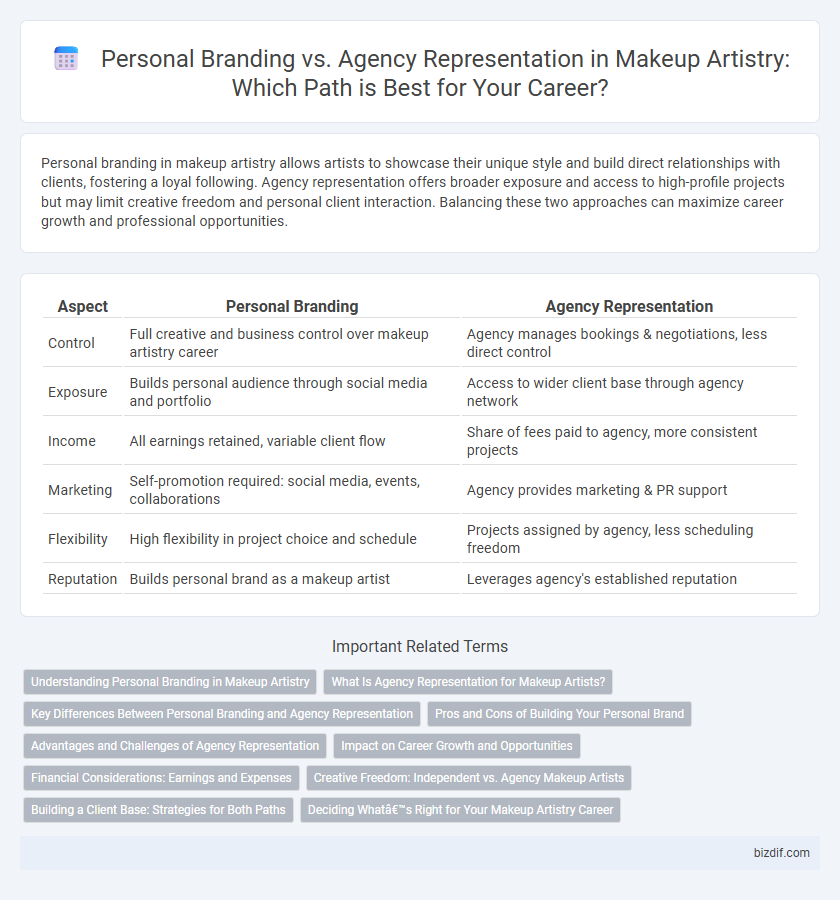Personal branding in makeup artistry allows artists to showcase their unique style and build direct relationships with clients, fostering a loyal following. Agency representation offers broader exposure and access to high-profile projects but may limit creative freedom and personal client interaction. Balancing these two approaches can maximize career growth and professional opportunities.
Table of Comparison
| Aspect | Personal Branding | Agency Representation |
|---|---|---|
| Control | Full creative and business control over makeup artistry career | Agency manages bookings & negotiations, less direct control |
| Exposure | Builds personal audience through social media and portfolio | Access to wider client base through agency network |
| Income | All earnings retained, variable client flow | Share of fees paid to agency, more consistent projects |
| Marketing | Self-promotion required: social media, events, collaborations | Agency provides marketing & PR support |
| Flexibility | High flexibility in project choice and schedule | Projects assigned by agency, less scheduling freedom |
| Reputation | Builds personal brand as a makeup artist | Leverages agency's established reputation |
Understanding Personal Branding in Makeup Artistry
Personal branding in makeup artistry centers on establishing a unique, recognizable identity that highlights individual creativity, style, and expertise. It involves curating a consistent portfolio, leveraging social media platforms like Instagram and TikTok, and engaging with clients directly to build trust and loyalty. Developing a strong personal brand differentiates makeup artists in a competitive market, fostering long-term client relationships and career growth.
What Is Agency Representation for Makeup Artists?
Agency representation for makeup artists involves collaboration with professional agencies that connect artists with clients and industry opportunities, enhancing career growth and visibility. Agencies handle contract negotiations, bookings, and client communications, allowing artists to focus on their creative work. This representation often leads to access to larger projects, such as fashion shows, editorial shoots, and commercial campaigns, which might be challenging to secure independently.
Key Differences Between Personal Branding and Agency Representation
Personal branding in makeup artistry emphasizes individual creative control, allowing artists to establish a unique style and direct client relationships, which fosters personal reputation and direct business growth. Agency representation offers access to larger networks, professional resources, and higher-profile opportunities, but artists must conform to agency standards and share revenue. Understanding these key differences helps makeup artists strategically choose between maintaining creative independence and leveraging institutional support for career advancement.
Pros and Cons of Building Your Personal Brand
Building a personal brand in makeup artistry allows for complete creative control and direct client relationships, fostering a unique professional identity that can lead to higher earnings and greater recognition. However, it demands significant time investment in marketing, consistency, and self-promotion to stand out in a competitive market without the support and resources typically provided by an agency. Balancing autonomy with the challenges of self-management, personal branding requires strategic planning to maximize exposure while maintaining artistic integrity.
Advantages and Challenges of Agency Representation
Agency representation offers makeup artists increased visibility through established industry connections and access to high-profile clients, accelerating career growth. Challenges include potential loss of creative control and dependency on agencies for job opportunities, which may limit personal brand development. Balancing agency benefits with maintaining a unique personal brand ensures long-term success and professional autonomy in the competitive makeup artistry market.
Impact on Career Growth and Opportunities
Personal branding in makeup artistry allows professionals to showcase unique styles and build direct client relationships, fostering greater control over career direction and financial growth. Agency representation offers access to broader networks, high-profile projects, and industry credibility, accelerating exposure and opportunity volume. Balancing both strategies can optimize career growth by combining personalized market positioning with expansive professional connections.
Financial Considerations: Earnings and Expenses
Personal branding in makeup artistry allows artists to retain full control over their earnings, maximizing profit margins by eliminating agency commissions but requires managing all business expenses independently, including marketing and client acquisition costs. Agency representation often guarantees a steady flow of high-profile clients and handles operational expenses, yet deducts a significant percentage from the artist's revenue, impacting overall take-home pay. Evaluating financial trade-offs between personal brand investment versus agency fees is crucial for sustainable income growth in the competitive makeup industry.
Creative Freedom: Independent vs. Agency Makeup Artists
Independent makeup artists enjoy greater creative freedom, allowing them to experiment with unique styles and personalized techniques without restrictions. Agency representation often requires adherence to specific brand guidelines and client preferences, which can limit artistic expression but provide steady work and industry connections. Balancing autonomy and stability is key for makeup artists navigating personal branding versus agency affiliation.
Building a Client Base: Strategies for Both Paths
Personal branding in makeup artistry centers on establishing a unique identity through social media engagement, portfolio development, and direct client interaction, fostering personalized trust and repeat business. Agency representation leverages established networks and marketing resources to access a wider client base quickly but often involves sharing client relationships and profits. Strategic collaboration, continuous skill enhancement, and targeted marketing campaigns are essential for both approaches to effectively build and sustain a loyal clientele.
Deciding What’s Right for Your Makeup Artistry Career
Choosing between personal branding and agency representation significantly impacts a makeup artist's career trajectory and opportunities. Personal branding allows for creative control and direct client relationships, essential for building a unique style and loyal clientele. Agency representation offers broader exposure, access to large-scale projects, and industry connections, which can accelerate professional growth within competitive markets.
Personal branding vs Agency representation Infographic

 bizdif.com
bizdif.com